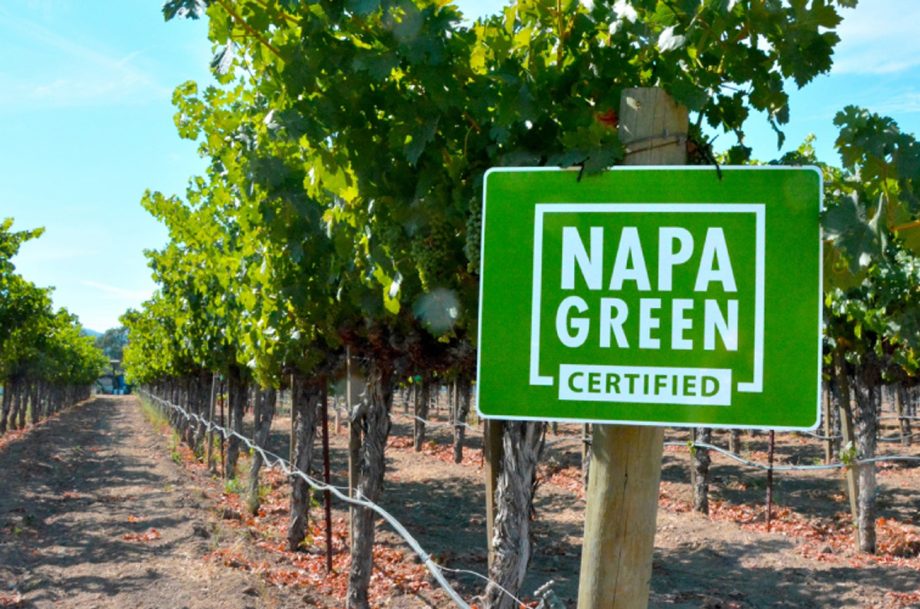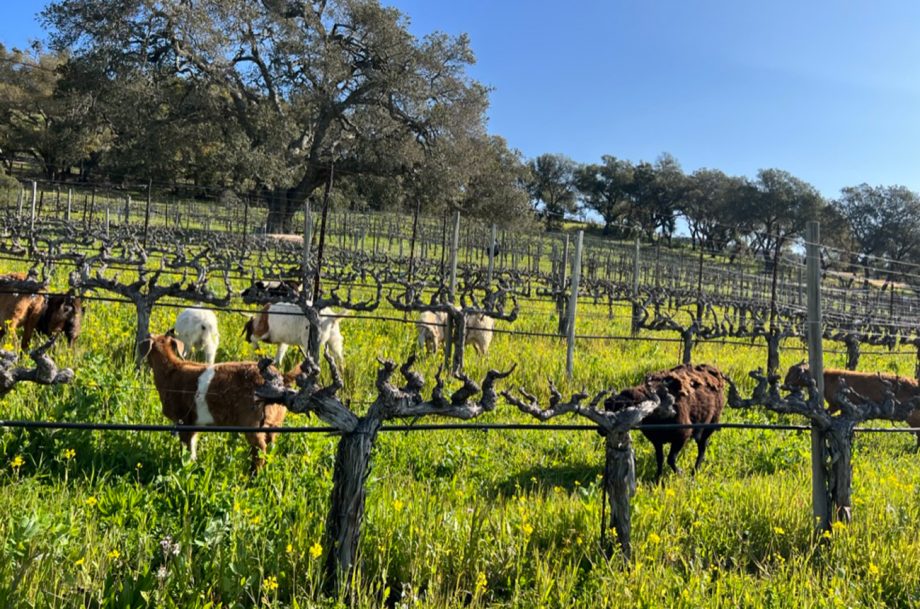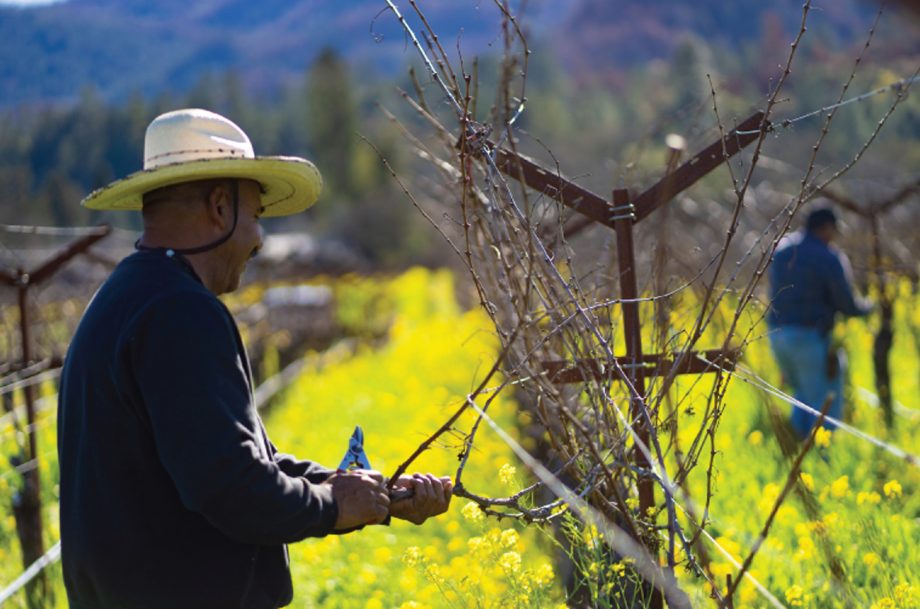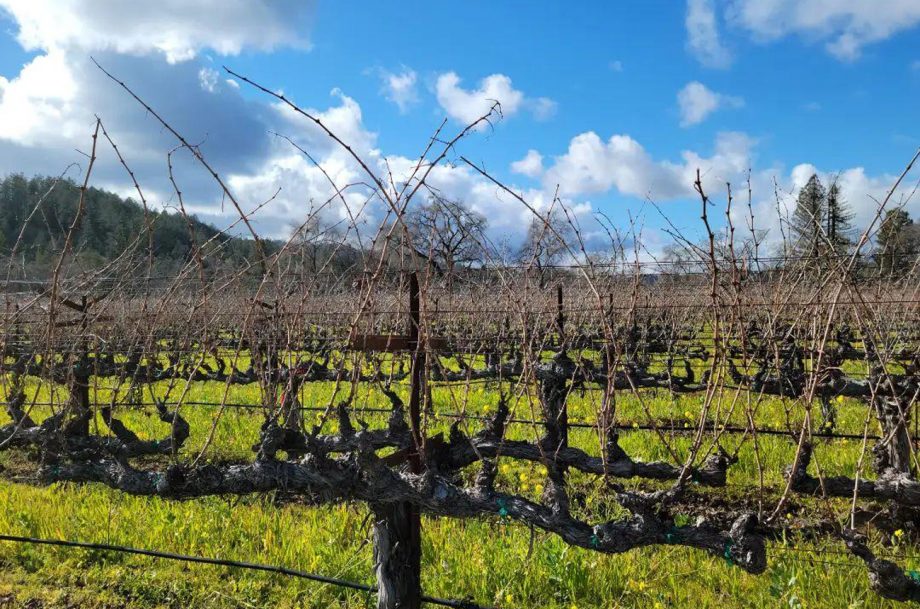In a groundbreaking initiative unveiled in November 2023, Napa Green, a powerhouse in sustainability certification in winemaking and grape growing, has set its sights on eradicating the use of synthetic herbicides, starting with Roundup – arguably the planet’s most ubiquitous and contentious weed killer.

Credit: Photo provided by Napa Green

Napa Green executive director Anna Brittain. Credit: Napa Green

Sheep grazing. Credit: White Rock Vineyards

Credit: Napa Green

Credit: Clive Pursehouse
Napa sustainability certification body to require phaseout of Roundup
At the forefront of this campaign is the elimination of glyphosate, the active ingredient in Roundup. It has been the subject of controversy and debates over its potential environmental and health impacts.
Numerous studies have cast doubt on glyphosate’s safety, revealing residues in soil, water, plants, animals, and even humans. The associated risks extend to pollinator declines, biodiversity loss and ecosystem dysfunction. Despite divided views among international regulatory bodies, the urgency centred around vineyard soil, vine health and wine quality takes centre stage in Napa Green’s ‘whole systems’ approach to sustainability and climate resilience.
‘If not now, when? Currently, we have 25 certified growers and roughly 40 growers actively transitioning to certification,’ said Anna Brittain, executive director of Napa Green. ‘Together, these farmers and wine growers represent over 2,800 hectares of vineyards.’
Stringent requirements
Of around 20 sustainable wine-growing certification programmes in the world, Napa Green stands alone in its lofty goal to eliminate synthetic herbicides.
‘Our ambitious 2026 vision and strategic plan has the goal to hit 8,000ha certified or enrolled in Napa Green Vineyard, as well as [making] at least 33% of Napa County vineyard acreage glyphosate or Roundup-free by 2028,’ Brittain continued.
Napa Green’s goal is to phase out all synthetic herbicides.
What is Roundup?
Developed by Monsanto in 1974, Roundup became a breakthrough weed-control mechanism for agriculture and a household name for the residential garden market.
Despite recent findings of glyphosate’s link to cancers and other clinical manifestations in humans as well as soil toxicity, the Environmental Protection Agency (EPA) has claimed that the chemical poses no risks when used according to instructions on the label.
While Bayer, who acquired Monsanto in 2018, welcomed the EPA’s statement, the company started removing glyphosate herbicides from the home gardening market this year to manage the continuing risks of litigation. However, Roundup continues to be widely available for commercial agriculture worldwide.
In the legal arena, a federal appeals court ruled in November that California cannot enforce a cancer warning on Roundup product labels, counter to the International Agency for Research on Cancer’s 2015 classification of glyphosate as a probable carcinogen.
Glyphosate and the soil biome
‘We have heard and read many studies on the use of glyphosate in vineyards but more importantly, we have seen its effects,’ said Kendall Smith, viticulturist at her family’s White Rock Vineyards.
Smith is referring to the damage that glyphosate poses to the beneficial microbial organisms in the soil, such as fungi, lichens, amoeba and protozoa, which are the building blocks of soil health. ‘The removal of plant life within and under the vine rows increases soil compaction, it impacts fertility, biodiversity and water infiltration,’ Smith continued.
Napa Green supporters such as fourth-generation RAEN winegrower and owner of Monarch Tractor, Carlo Mondavi, couldn’t agree more.
‘Glyphosate is the number one herbicide used across the globe. There is so much used, it’s alarming,’ said Mondavi. ‘When you look at what this does to organic matter and soils, it’s troubling.’
Mondavi explains that nutrient deficiencies or imbalances due to reduced organic matter may also impact yeast metabolism, impeding healthy and natural winemaking fermentation.
The real struggle lies in changing the way farmers have been operating for nearly a century. Modern agriculture has promoted synthetic herbicides. Monoculture has led to a decrease in biodiversity. Weeds have become the unsightly enemy.
Changing habits
‘Our great grandparents didn’t farm like this,’ says Mondavi, who comes from generations of synthetic herbicide-free farming.
However, alternative methods are not without issue. Manual labour is expensive. Heavy tractor use in the rainy spring season can cause compaction and soil disturbances.
Like glyphosate, gas-powered tools are products of fossil fuel, creating sustainability challenges of their own. Equipment can be expensive and not as useful in rocky or hilly terrain. The low efficacy of organic herbicides means that continuous applications are necessary.
But Napa Green offers useful resources including the Weed Management Toolkit found on the organisation’s website.
‘We also established a pool of matching funds that growers can apply for to support phaseout, and we are planning a series of training workshops to assist members in this transition,’ said Brittain.
‘It’s not as hard as people think it is,’ said Salvestrin Winery winemaker and viticulturist Natalie Winkler, about moving toward toward organic farming. Over her 14 years in farming, she has transitioned several vineyards to organic and regenerative farming through her company, Traditional and Biodynamic Vineyard Consulting.
‘If you have vegetation that is mowed and controlled, that’s really not a problem,’ she said. Winkler claims that sheep grazing is a great tool, especially in the spring when the soil is too wet for large equipment.
White Rock Vineyards abandoned herbicides in the late 1990s, embracing diversification with fruit and olive trees, plants, insectary rows and animals. Introducing plant diversity can contribute to diverse root structures, fostering a more resilient and dynamic soil ecosystem.
According to Ben Mackie, Napa Green’s vineyard programme manager, soil health begins to rebound soon after the last herbicide application. Mackie has been designing and implementing regenerative farming systems in a variety of ecosystems for more than 15 years.
‘Fungal hyphae, bacterial diversity and invertebrates like earthworms need time to repopulate,’ Mackie said. ‘This process can be jump-started with applications of compost or compost tea under the vines, and use of nutrient-adding cover crops.’
Economics at play
Some of the main reasons for resistance to phasing out glyphosate are increased labour, equipment and fuel costs. Napa Green offers valuable case studies that cover the ‘how and costs’ of an herbicide-free vineyard by members who share useful information about weed varieties, undervine weed management costs, sheep grazing and more.
Mondavi emphasises the importance of making sustainable practices economically superior for widespread adoption. And while practising pre-industrial agriculture is a smart and effective option, incorporating modern technology – such as electricity – can be beneficial, too.
‘Mowing is 100% reduction of the chemical,’ said Mondavi, who advocates regenerative and organic agriculture with the help of smart electric tractors. ‘The savings are immense, especially for farmers who have a significant amount of land.’
Adding to the economic conversation, Winkler points out the myriad of benefits associated with improved soil and vine health over time – a return on investment with increased nutrient cycling, organic matter levels, soil organic carbon and water retention.
‘When we observe what follows after the elimination of glyphosate-based herbicides, what we gain is better vine functionality and an overall increase in soil fertility. This directly affects vineyard longevity and [the] ability to withstand adverse environmental conditions, which are becoming more common,’ said Winkler.
Terroir and aesthetics
Besides offering solutions to vineyard managers on organic and regenerative practices, Winkler also suggests educating the wine consumers’ aesthetic expectations of vineyards.
‘A vineyard floor where there is only the vine is not a healthy situation,’ said Winkler. ‘That’s a monoculture. The more biodiversity you can bring in with cover crops and native vegetation, the more diverse your microbial species are the healthier the soil can be.’
‘And how can you argue about terroir? As the chemicals are undermining the soil microbiome, they are essentially taking away the “terroir” and sense of place – the very things that wine lovers and wine producers talk about all the time,’ said Brittain. She stresses that terroir is a reflection of the land’s microclimate as well as its underground ecosystem.
The journey to eliminate glyphosate from vineyards represents a pivotal moment in the wine industry’s commitment to sustainability. Napa Green’s ‘whole systems’ approach aims to not only showcase the true essence of the vineyard site but also to preserve the environment and pass down healthier vineyards to future generations.
Making the commitment to third party certification takes time and effort, but it is worth it to demonstrate our commitment to the community and to protect our watershed, our land and the air we breathe.
- Susan Boswell, Chateau Boswell Winery
